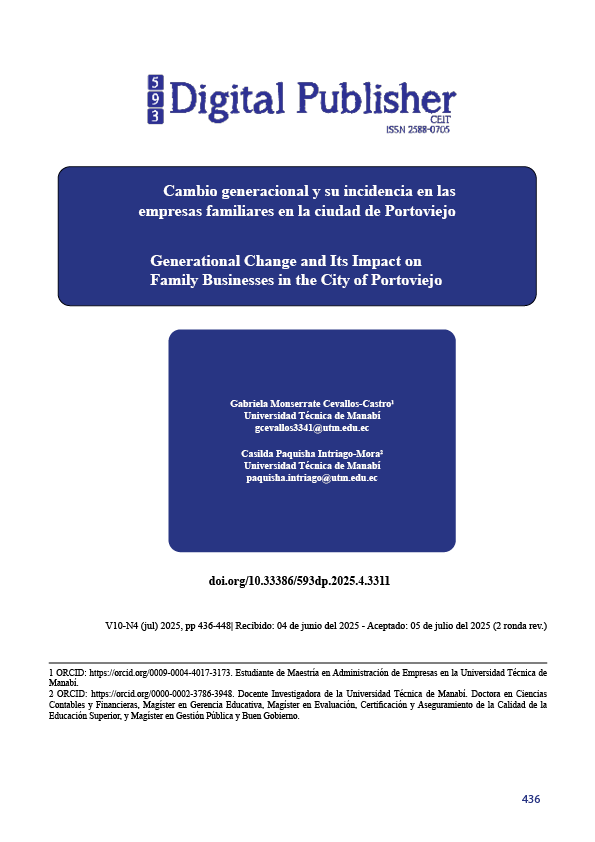Generational Change and Its Impact on Family Businesses in the City of Portoviejo
Main Article Content
Abstract
In the Ecuadorian context, family businesses constitute an essential component of the productive fabric. However, they face significant challenges related to generational change, the mismanagement of which can compromise their sustainability. This study aimed to analyze the impact of generational change on family businesses in the city of Portoviejo. A quantitative, non-experimental, cross-sectional, and descriptive-correlational approach was adopted. A structured questionnaire was applied to a non-probabilistic sample of 85 representatives of active family businesses, using a Likert-type scale across eight dimensions. The reliability of the instrument was confirmed through Cronbach’s alpha coefficient, and the data were processed using SPSS version 26 through multiple regression analysis and validation of structural hypotheses. The results showed that five out of six hypotheses were accepted, highlighting the positive influence of professionalization, successor training, and especially emerging leadership as a key predictor of sustainability. In contrast, the management of generational conflicts did not show a significant effect. It is concluded that generational transition should be addressed from a strategic perspective that integrates leadership, institutionalization, and organizational adaptation.
Downloads
Article Details

This work is licensed under a Creative Commons Attribution-NonCommercial-ShareAlike 4.0 International License.
1. Derechos de autor
Las obras que se publican en 593 Digital Publisher CEIT están sujetas a los siguientes términos:
1.1. 593 Digital Publisher CEIT, conserva los derechos patrimoniales (copyright) de las obras publicadas, favorece y permite la reutilización de las mismas bajo la licencia Licencia Creative Commons 4.0 de Reconocimiento-NoComercial-CompartirIgual 4.0, por lo cual se pueden copiar, usar, difundir, transmitir y exponer públicamente, siempre que:
1.1.a. Se cite la autoría y fuente original de su publicación (revista, editorial, URL).
1.1.b. No se usen para fines comerciales u onerosos.
1.1.c. Se mencione la existencia y especificaciones de esta licencia de uso.
References
Buchanan, D., Fitzgerald, L., Ketley, D., Gollop, R., Jones, J. L., Lamont, S. Saint, Neath, A., & Whitby, E. (2005). No going back: A review of the literature on sustaining organizational change. International Journal of Management Reviews, 7(3), 189–205. https://doi.org/10.1111/j.1468-2370.2005.00111.x
Cabanilla, G. (2019). Caracterización del perfil del empresario, análisis del impacto en la gestión de la pyme familiar : caso empresarios ecuatorianos de pequeñas y medianas empresas familiares [Université de Bordeaux]. https://theses.hal.science/tel-02291823v1
Diaz-Moriana, V., Hogan, T., Clinton, E., & Brophy, M. (2019). Defining Family Business: A Closer Look at Definitional Heterogeneity. In The Palgrave Handbook of Heterogeneity among Family Firms (pp. 333–374). Springer International Publishing. https://doi.org/10.1007/978-3-319-77676-7_13
Filser, M., Kraus, S., & Märk, S. (2013). Psychological aspects of succession in family business management. Management Research Review, 36(3), 256–277. https://doi.org/10.1108/01409171311306409
Fischer-Kreer, D., Greven, A., Eichwald, I. C., Bendig, D., & Brettel, M. (2021). Organizational Psychological Capital in Family Firms: the Role of Family Firm Heterogeneity. Schmalenbach Journal of Business Research, 73(3–4), 413–441. https://doi.org/10.1007/s41471-021-00124-6
Gatto, A. (2020). A pluralistic approach to economic and business sustainability: A critical meta‐synthesis of foundations, metrics, and evidence of human and local development. Corporate Social Responsibility and Environmental Management, 27(4), 1525–1539. https://doi.org/10.1002/csr.1912
Guillén González, M. G., & García Briones, M. Y. (2025). Cultura organizacional de las empresas familiares del Cantón Portoviejo. Revista San Gregorio, 1(Especial_2), 7–14. https://doi.org/10.36097/rsan.v1iEspecial_2.3220
Hermosa-Vega, G. G. (2022). Liderazgo y Gobernanza en Empresas Familiares en Ecuador. Revista Científica Zambos, 1(1), 13–32. https://doi.org/10.69484/rcz/v1/n1/20
Karman, A. (2019). The role of human resource flexibility and agility in achieving sustainable competitiveness. International Journal of Sustainable Economy, 11(4), 324. https://doi.org/10.1504/IJSE.2019.103472
Malik, P., & Garg, P. (2020). Learning organization and work engagement: the mediating role of employee resilience. The International Journal of Human Resource Management, 31(8), 1071–1094. https://doi.org/10.1080/09585192.2017.1396549
Núñez-Liberio, R. V., & Ruiz-López, S. E. (2023). Hallazgos de la literatura académica sobre la gestión de la innovación en empresas familiares. Innova Science Journal, 1(3), 1–14. https://doi.org/10.63618/omd/isj/v1/n3/17
Ouiakoub, M., & Rehm, T. P. (2025). Succession in family businesses: an opportunity to change the business model. International Journal of Entrepreneurship and Small Business, 54(1), 98–129. https://doi.org/10.1504/IJESB.2025.142891
Qiu, H., & Freel, M. (2020). Managing Family-Related Conflicts in Family Businesses: A Review and Research Agenda. Family Business Review, 33(1), 90–113. https://doi.org/10.1177/0894486519893223
Ronald Huacca-Incacutipa, Regis André J. Fernández Argandoña, Lucio Walter M. Valderrama Pérez, & Alejandro Nuñez-Vizcarra. (2022). Internal control and corporate governance in family businesses: A review of studies and approaches from a Latin American perspective. Journal of Pharmaceutical Negative Results, 13(4), 666–675. https://doi.org/10.47750/pnr.2022.13.04.089
Torner, C. S. (2023). Relación entre liderazgo ético y motivación intrínseca. El rol mediador de la creatividad y el múltiple efecto moderador del compromiso de continuidad. Revista de Métodos Cuantitativos Para La Economía y La Empresa. https://doi.org/10.46661/rev.metodoscuant.econ.empresa.7406
Schulze, J. H., & Pinkow, F. (2020). Leadership for Organisational Adaptability: How Enabling Leaders Create Adaptive Space. Administrative Sciences, 10(3), 37. https://doi.org/10.3390/admsci10030037
Shahzad, F., Akhlaq, A., & Ghaffar, C. (2024). Exploring business succession dynamics in family-owned businesses: lessons from Pakistani case studies. Journal of Family Business Management. https://doi.org/10.1108/JFBM-09-2024-0214
Soto Maciel, A., De la Garza Ramos, M. I., Esparza Aguilar, J. L., & San Martín Reyna, J. M. (2019). La sucesión de la empresa familiar; una aproximación teórica. Cuadernos de Administración, 31(56), 105–137. https://doi.org/10.11144/Javeriana.cao.31-56.sefat
Tahir, R., & Baradie, M. El. (2022). Challenges in the succession process: the case of Indian family businesses in the United Arab Emirates. Middle East J. of Management, 9(6), 612. https://doi.org/10.1504/MEJM.2022.126324
Uhl-Bien, M., Marion, R., & McKelvey, B. (2007). Complexity Leadership Theory: Shifting leadership from the industrial age to the knowledge era. The Leadership Quarterly, 18(4), 298–318. https://doi.org/10.1016/j.leaqua.2007.04.002
Vazquez, P., Carrera, A., & Cornejo, M. (2020). Corporate governance in the largest family firms in Latin America. Cross Cultural & Strategic Management, 27(2), 137–163. https://doi.org/10.1108/CCSM-11-2018-0194



